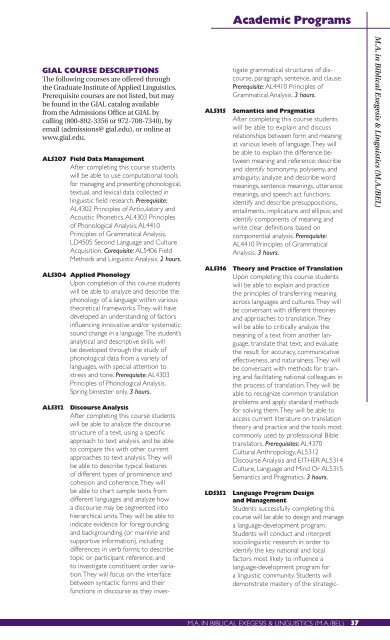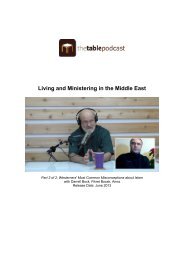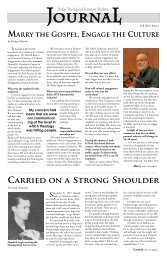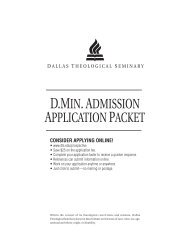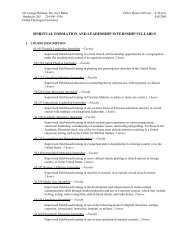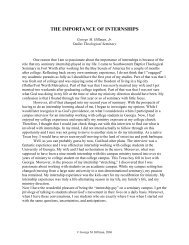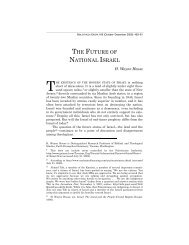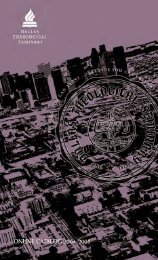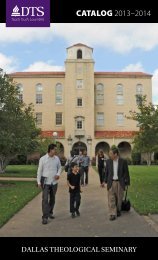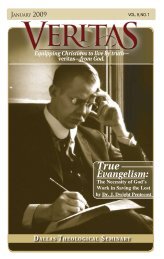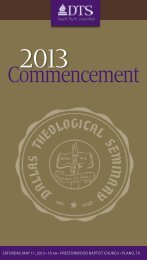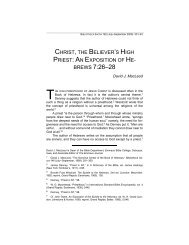Academic Programs - Dallas Theological Seminary
Academic Programs - Dallas Theological Seminary
Academic Programs - Dallas Theological Seminary
You also want an ePaper? Increase the reach of your titles
YUMPU automatically turns print PDFs into web optimized ePapers that Google loves.
GIAL COURSE DESCRIPTIONS<br />
The following courses are offered through<br />
the Graduate Institute of Applied Linguistics.<br />
Prerequisite courses are not listed, but may<br />
be found in the GIAL catalog available<br />
from the Admissions Office at GIAL by<br />
calling (800-892-3356 or 972-708-7340), by<br />
email (admissions@ gial.edu), or online at<br />
www.gial.edu.<br />
AL5207 Field Data Management<br />
After completing this course students<br />
will be able to use computational tools<br />
for managing and presenting phonological,<br />
textual, and lexical data collected in<br />
linguistic field research. Prerequisite:<br />
AL4302 Principles of Articulatory and<br />
Acoustic Phonetics, AL4303 Principles<br />
of Phonological Analysis, AL4410<br />
Principles of Grammatical Analysis,<br />
LD4505 Second Language and Culture<br />
Acquisition. Corequisite: AL5406 Field<br />
Methods and Linguistic Analysis. 2 hours.<br />
AL5304 Applied Phonology<br />
Upon completion of this course students<br />
will be able to analyze and describe the<br />
phonology of a language within various<br />
theoretical frameworks. They will have<br />
developed an understanding of factors<br />
influencing innovative and/or systematic<br />
sound change in a language. The student’s<br />
analytical and descriptive skills will<br />
be developed through the study of<br />
phonological data from a variety of<br />
languages, with special attention to<br />
stress and tone. Prerequisite: AL4303<br />
Principles of Phonological Analysis.<br />
Spring bimester only. 3 hours.<br />
AL5312<br />
AL5315<br />
Discourse Analysis<br />
After completing this course students<br />
will be able to analyze the discourse<br />
structure of a text, using a specific<br />
approach to text analysis, and be able<br />
to compare this with other current<br />
approaches to text analysis. They will<br />
be able to describe typical features<br />
of different types of prominence and<br />
cohesion and coherence. They will<br />
be able to chart sample texts from<br />
different languages and analyze how<br />
a discourse may be segmented into<br />
hierarchical units. They will be able to<br />
indicate evidence for foregrounding<br />
and backgrounding (or mainline and<br />
supportive information), including<br />
differences in verb forms; to describe<br />
topic or participant reference; and<br />
to investigate constituent order variation.<br />
They will focus on the interface<br />
between syntactic forms and their<br />
functions in discourse as they investigate<br />
grammatical structures of discourse,<br />
paragraph, sentence, and clause.<br />
Prerequisite: AL4410 Principles of<br />
Grammatical Analysis. 3 hours.<br />
Semantics and Pragmatics<br />
After completing this course students<br />
will be able to explain and discuss<br />
relationships between form and meaning<br />
at various levels of language. They will<br />
be able to explain the difference between<br />
meaning and reference; describe<br />
and identify homonymy, polysemy, and<br />
ambiguity; analyze and describe word<br />
meanings, sentence meanings, utterance<br />
meanings, and speech act functions;<br />
identify and describe presuppositions,<br />
entailments, implicature and ellipsis; and<br />
identify components of meaning and<br />
write clear definitions based on<br />
componential analysis. Prerequisite:<br />
AL4410 Principles of Grammatical<br />
Analysis. 3 hours.<br />
AL5316 Theory and Practice of Translation<br />
Upon completing this course students<br />
will be able to explain and practice<br />
the principles of transferring meaning<br />
across languages and cultures. They will<br />
be conversant with different theories<br />
and approaches to translation. They<br />
will be able to critically analyze the<br />
meaning of a text from another language,<br />
translate that text, and evaluate<br />
the result for accuracy, communicative<br />
effectiveness, and naturalness. They will<br />
be conversant with methods for training<br />
and facilitating national colleagues in<br />
the process of translation. They will be<br />
able to recognize common translation<br />
problems and apply standard methods<br />
for solving them. They will be able to<br />
access current literature on translation<br />
theory and practice and the tools most<br />
commonly used by professsional Bible<br />
translators. Prerequisites: AL4370<br />
Cultural Anthropology, AL5312<br />
Discourse Analysis and EITHER AL5314<br />
Culture, Language and Mind Or AL5315<br />
Semantics and Pragmatics. 3 hours.<br />
LD5352<br />
<strong>Academic</strong> <strong>Programs</strong><br />
<strong>Academic</strong> <strong>Programs</strong><br />
Language Program Design<br />
and Management<br />
Students successfully completing this<br />
course will be able to design and manage<br />
a language-development program.<br />
Students will conduct and interpret<br />
sociolinguistic research in order to<br />
identify the key national and local<br />
factors most likely to influence a<br />
language-development program for<br />
a linguistic community. Students will<br />
demonstrate mastery of the strategic-<br />
M.A. in Biblical Exegesis & Linguistics (M.A./BEL)<br />
M.A. IN BIBLICAL EXEGESIS & LINGUISTICS (M.A./BEL)<br />
37


